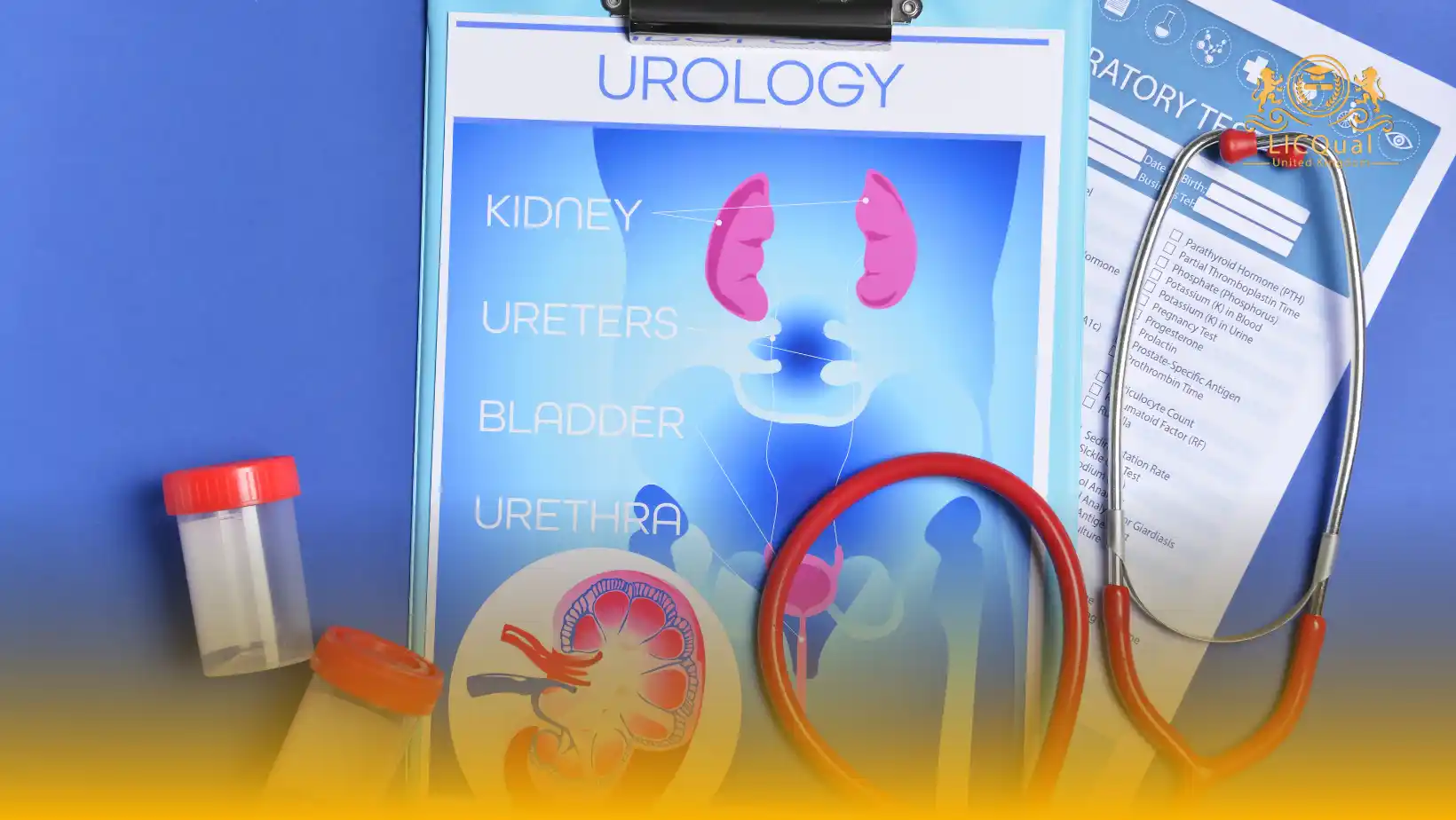The LICQual Level 3 Certificate in Urology (Cert U) is a specialized qualification designed for healthcare professionals seeking to deepen their expertise in urology and advance their clinical knowledge. This qualification is not intended for fresh candidates but is aimed at learners with prior medical or healthcare experience who wish to enhance their career prospects, broaden their professional understanding, and strengthen their Continuing Professional Development (CPD).
Through this course, learners will gain a comprehensive understanding of urological conditions, diagnostic procedures, and treatment strategies. The curriculum covers both theoretical knowledge and practical applications, ensuring learners are equipped to manage a wide range of urological cases with confidence and competence. Learners will explore topics such as urinary tract disorders, renal health, surgical interventions, and patient care management within the urology field.
LICQual ensures that centres delivering this qualification maintain the highest standards of teaching and learning. Centres must employ competent and qualified staff and provide learners with all necessary resources, clinical tools, and learning materials to ensure a thorough and effective educational experience. This guarantees that learners receive the support and guidance needed to achieve successful outcomes and apply their knowledge confidently in professional healthcare settings.
Ideal for professionals who aspire to enhance their clinical expertise, improve patient care, and progress their careers in urology, the LICQual Level 3 Certificate in Urology offers a structured, career-focused pathway for advanced learning in this specialized area of healthcare.
Course Overview
Qualification Title
LICQual Level 3 Certificate in Urology (Cert U)
Total Units
6
Total Credits
24
GLH
120
Qualification #
LICQ2200845
Qualification Specification
To enroll in the LICQual Level 3 Certificate in Urology (Cert U) , applicants must meet the following criteria:
|
Qualification# |
Unit Title |
Credits |
GLH |
|---|---|---|---|
|
LICQ2200845-1 |
Introduction to Urology and Urinary System Anatomy |
4 |
20 |
|
LICQ2200845-2 |
Common Urological Disorders and Pathophysiology |
4 |
20 |
|
LICQ2200845-3 |
Diagnostic Procedures in Urology |
4 |
20 |
|
LICQ2200845-4 |
Urological Treatments and Interventions |
4 |
20 |
|
LICQ2200845-5 |
Urology in Special Populations |
4 |
20 |
|
LICQ2200845-6 |
Professional Practice, Ethics, and Continuing Professional Development (CPD) |
4 |
20 |
By the end of this course, learners will be able to:
Unit 1: Introduction to Urology and Urinary System Anatomy
By the end of this unit, learners will be able to:
- Explain the structure and function of the urinary system, including kidneys, bladder, ureters, and urethra.
- Describe normal physiological processes of the urinary tract.
- Identify common urological conditions and their clinical significance.
- Analyse the role of urology within the broader healthcare context.
Unit 2: Common Urological Disorders and Pathophysiology
By the end of this unit, learners will be able to:
- Identify and classify major urological disorders, including urinary tract infections, kidney stones, and prostate conditions.
- Explain the pathophysiology and risk factors of common urological diseases.
- Recognise clinical signs and symptoms of urological conditions.
- Evaluate evidence-based management and treatment approaches.
Unit 3: Diagnostic Procedures in Urology
By the end of this unit, learners will be able to:
- Describe laboratory tests, imaging techniques, and functional assessments used in urology.
- Apply patient assessment skills to identify and monitor urological conditions.
- Interpret diagnostic results to inform clinical decisions.
- Assess the importance of patient history and symptom evaluation in diagnosis.
Unit 4: Urological Treatments and Interventions
By the end of this unit, learners will be able to:
- Explain pharmacological, surgical, and minimally invasive treatment options for urological conditions.
- Apply preoperative and postoperative care procedures effectively.
- Evaluate the safety and effectiveness of different treatment methods.
- Develop patient management strategies based on current clinical guidelines.
Unit 5: Urology in Special Populations
By the end of this unit, learners will be able to:
- Identify urological issues specific to paediatric, geriatric, and female patient populations.
- Recognise age- and gender-specific risk factors and conditions.
- Apply tailored assessment and management strategies for diverse patient groups.
- Address challenges in delivering effective urological care to vulnerable populations.
Unit 6: Professional Practice, Ethics, and Continuing Professional Development (CPD)
By the end of this unit, learners will be able to:
- Demonstrate professional and ethical responsibilities in urology practice.
- Communicate effectively with patients, families, and multidisciplinary teams.
- Reflect on clinical practice to enhance decision-making and patient care.
- Plan and actively engage in CPD activities to maintain and enhance professional competence.
The LICQual Level 3 Certificate in Urology (Cert U) is designed for healthcare professionals, students, and practitioners who want to strengthen their expertise in urinary tract health, renal care, and urological disorders. This Level 3 Urology qualification is ideal for those seeking CPD accreditation, career advancement, or a pathway into specialized medical practice. Whether you are already working in clinical care, diagnostics, or planning to enter the healthcare sector, this course provides the skills, recognition, and confidence to excel.
1. Healthcare Professionals in Clinical Practice
- Doctors and nurses aiming to expand knowledge of urological conditions
- Allied health staff supporting patients with urinary tract disorders
- Clinicians seeking CPD-accredited urology training
- Professionals working in hospitals, clinics, and diagnostic centers
- Staff preparing for advanced roles in renal and bladder care
2. Laboratory and Diagnostic Staff
- Laboratory technicians handling urology-related specimens
- Assistants seeking structured training in renal and urinary diagnostics
- Professionals aiming to improve accuracy in urological testing
- Staff preparing for supervisory or advanced laboratory roles
- Technicians aligning with international healthcare standards
3. Medical and Healthcare Students
- Students pursuing medicine, nursing, or biomedical sciences
- Learners preparing for postgraduate studies in urology or nephrology
- Graduates seeking a recognized Level 3 urology qualification
- Students interested in urinary tract health and diagnostic procedures
- Individuals bridging academic knowledge with practical healthcare skills
4. Public Health and Community Healthcare Workers
- Professionals working in urinary health awareness and outreach programs
- Staff supporting patients with kidney stones, prostate issues, or bladder disorders
- Workers in rural or underserved healthcare systems
- Public health officers seeking CPD-recognized urology training
- Community healthcare providers expanding diagnostic knowledge
5. International Healthcare Professionals
- Overseas medical staff seeking UK-recognized urology qualifications
- Professionals aiming to meet global healthcare and NGO standards
- Migrant healthcare workers preparing for international career opportunities
- Staff needing formal certification for regulatory compliance
- Learners looking for flexible, accessible online urology training
6. Career Changers Entering Healthcare
- Professionals from science or biology backgrounds transitioning into healthcare
- Individuals seeking structured entry into urology and renal health
- Career changers aiming for stable, in-demand healthcare roles
- Learners motivated by long-term career security in medical fields
- Adults seeking accredited qualifications for professional credibility
7. Research and Academic Professionals
- Researchers exploring urinary tract and renal health disorders
- Academic staff supporting healthcare and medical training programs
- Professionals contributing to urology-focused research projects
- Educators seeking CPD in urinary and renal health sciences
- Scholars aiming to expand expertise in applied clinical urology
To deliver the LICQual Level 3 Certificate in Urology effectively and ensure learner success, centres must meet the following requirements:
- Qualified and Competent Staff: Centres must employ experienced healthcare professionals and qualified instructors with expertise in urology. Staff should be capable of delivering both theoretical knowledge and practical training to international standards.
- Comprehensive Learning Resources: Centres must provide learners with access to up-to-date textbooks, reference materials, case studies, and digital resources that support effective learning and understanding of urological practice.
- Practical Training Facilities: Centres should be equipped with adequate clinical training tools, simulation equipment, and laboratory facilities to allow learners to practice urology techniques safely and effectively.
- Assessment and Support Systems: Centres must implement robust assessment strategies, including written assignments, practical evaluations, and feedback mechanisms. Learners should receive mentoring and guidance throughout the course.
- Health and Safety Compliance: Centres must maintain safe, clean, and well-organized learning environments that comply with local health and safety regulations, ensuring learner and patient safety during practical sessions.
- Continuing Professional Development (CPD) Opportunities: Centres should encourage learners to engage in CPD activities, helping them maintain professional competence and stay updated with advances in urology practice.
- Access to Digital and Online Learning Tools: Centres should provide reliable access to e-learning platforms, virtual simulations, and supplementary online resources to enhance learning and flexibility.
By meeting these standards, centres ensure that learners receive high-quality, professional training that equips them with the knowledge, skills, and confidence to excel in urology and advance their careers in healthcare.
Assessment and Verification
All units within this qualification are subject to internal assessment by the approved centre and external verification by LICQual. The qualification follows a criterion-referenced assessment approach, ensuring that learners meet all specified learning outcomes.
To achieve a ‘Pass’ in any unit, learners must provide valid, sufficient, and authentic evidence demonstrating their attainment of all learning outcomes and compliance with the prescribed assessment criteria. The Assessor is responsible for evaluating the evidence and determining whether the learner has successfully met the required standards.
Assessors must maintain a clear and comprehensive audit trail, documenting the basis for their assessment decisions to ensure transparency, consistency, and compliance with quality assurance requirements.







